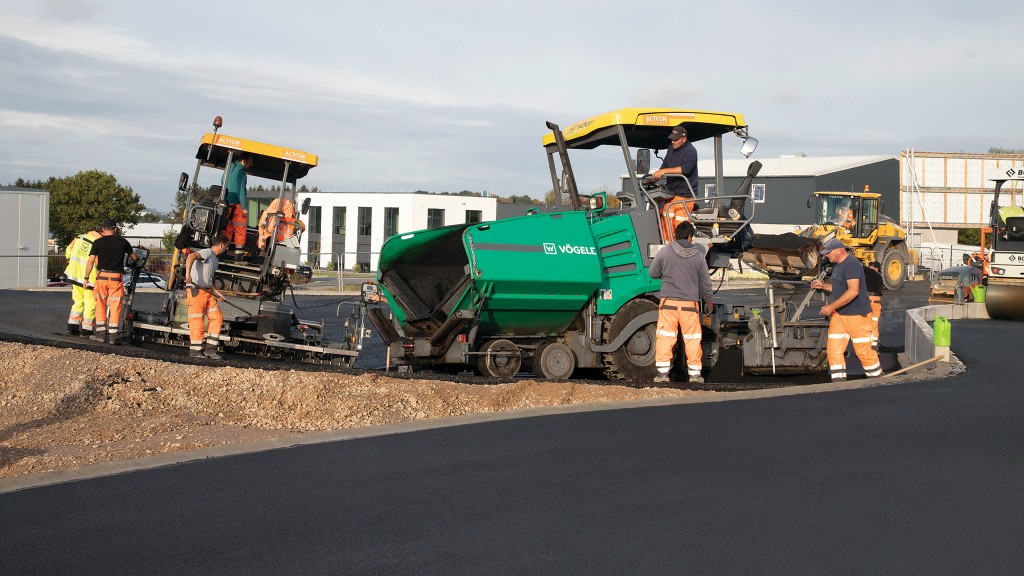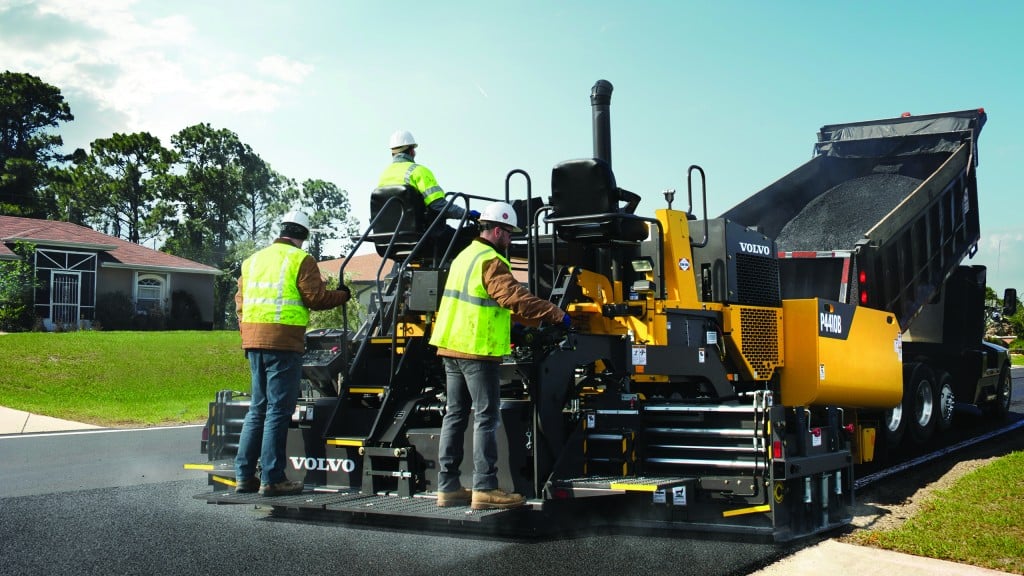
Asphalt paving work is fast and demanding. Contractors need to be ready to accept trucks, get a mat laid down, and get compactors on it as efficiently as possible to ensure the quality of the surface is ideal. That's why reliability is key for asphalt pavers and screeds - if the machine goes down, the whole process goes down, and someone isn't getting paid.
Heavy Equipment Guide consulted a panel of asphalt paving experts to discuss the features and functions of today's asphalt pavers and screeds and how these machines have been improved to ensure the easiest maintenance and best possible uptime.
Designed to stay on the job
When it comes to the design aspects of pavers and screeds that help keep them in the field and out of the repair bay, manufacturers have taken a variety of approaches to expand uptime. Ease of daily maintenance, on-board monitoring, and other features are several areas kept in mind during paver design.
Blaw-Knox has taken an approach to ensure that all parts of today's complex pavers are easier to maintain, according to Director of Engineering Bill Laing.
"New high-tech parts that are more durable and require less attention is the name of the game. The use of higher quality components like lifetime lubricated bearings in the auger-conveyor system is one example of how modern technology is increasing uptime for contractors," Laing said.
Modern powertrains are more sophisticated but also more durable and dependable, he noted. Plus, consideration is given to areas that might not be the first to spring to mind for buyers, such as asphalt cleanup. Laing noted the use of semi-automated wash-down systems that reach hard to access parts of a paver, as well as a move away from fasteners such as nuts and bolts that can be difficult to clean, as routes that Blaw-Knox has taken in its design efforts.
Standardized design aids in reducing the amount of time a machine may be down for repair and can allow crews to get back up and running quickly, according to Keith Hagy, paving product manager with Astec Industries. While dealers and manufacturers appreciate ongoing service contracts with their customers, they also recognize that day to day work needs to keep going, so designs have begun to take that into account with things like common, easily acquired parts.
"Hydraulics is a big area; you don't want a hydraulic leak on a job," Hagy said. "By using common, easily available hose sizes and fittings you don't have to wait around for a service call – in most cases you can get off-the-shelf replacements."
A collection of important and frequently used parts can be a big help to paving crews, noted Chaunce Edwards, technical support specialist with SMS Equipment, which represents BOMAG.
"We have uptime kits that are developed with any items that you might need to finish out the day – let's say you're paving and run into a failure; the model specific kits we have contain key components which we sell as an assembly to the end user," Edwards described. "This is something the operator or foreman can have in their truck. If they happen to go down, they have this stuff on hand to keep the unit running and get it through the shift."
BOMAG machines have easy-to-replace wear items throughout, such as sectional floor plates that can be individually replaced rather than having wear across the whole floor, Edwards noted. This can eliminate longer downtime or expensive off-season replacement.
At Dynapac, design starts from the bottom and works upward, giving their pavers strength while reducing stress on the machine's tracks, according to Vijay Palanisamy, director – product marketing and communications. The iTrack intelligent track system is available on the company's D25 and D30 highway-class pavers.
"We used a box frame design, which is a very unique design principle that reduces the stress on the tracks itself . . . so you don't have to change the track components very often," Palanisamy related. "Typically if you run a track on loose gravel or other certain places it can tend to throw the tracks off in a normal design. With our intelligent track system, it automatically stops the tracks if the pressure is lower than what it needs to be."
Ease of use and long life of components are important parts of Caterpillar's paving equipment, according to sales support consultant Jon Anderson. He noted that sealed bearings on track systems, a screed heating system that uses an integrated generator built for the life of the paver, machined screed frames to make screed plate installation and levelling easier, and sealed pods with a 500-hour service interval on the screed's vibratory system all deliver big improvements to uptime.
For Vögele, a big part of uptime focuses on redundancy. Jim Holland, North American vice president of sales, explained that many systems on Vögele pavers are designed so that if something goes down, there are ways to ensure the machine can keep working.
"We know you have perishable product in front of the paver. Our goal is, if the engine and the undercarriage are working and the final drives are moving, we want to be able to have you up and going within 10 or 15 minutes," Holland said. That's accomplished by the ability to pull hoses, coils, or other small parts from systems that might not be in use at that time and replace the failed parts on the spot, allowing the paver to keep working and finish the job before service is done.
Access is another area that has been given more consideration on newer pavers, providing operators greater opportunity to complete daily maintenance tasks. Hagy pointed out that the ability to fully raise a hood or use easy to open side panels to access a paver engine makes it more likely that daily maintenance checks will be carried out on the proper schedule, and when work is required reduces the challenges for service technicians. In addition, Astec offers a backup hydraulic system that operates manually – when a machine goes down, it's difficult to gain access under the hood and elsewhere if the hydraulics are not working, so a backup is key for the best access possible.
Design for access is important to Vögele customers, Holland said, and the company has made an effort to ensure that all its key systems are simple to access – including some of the larger parts, like the direct-drive generator, for example. When generators need to be replaced it's often a difficult task because they're installed below the engines on many pavers, he said; Vögele makes their generator easier to access, reducing downtime to hours instead of days.
Dynapac offers the ability to push a button even when the engine isn't running to allow the whole hood to lift, providing easy access to the engine compartment, according to Palanisamy. Several manufacturers have made it easier to reach areas where asphalt might collect and harden, allowing for easier cleaning.
Maintenance features expanded
Manufacturers have given maintenance needs even more thought beyond making daily checks easier. There are plenty of features that can make life easier for workers who need to maintain and service pavers.
Laing said that pavers have moved towards more ground level checks over time, and visibility to encourage maintenance has improved as well, including a maintenance "race track" chart that uses diagrams to note the maintenance needs of Blaw-Knox pavers.
"Each circle signifies a maintenance interval with leader lines that point to the area requiring service. Plus, a symbol indicates what service needs to be done," Laing said. "Further clarification can be found in the operator's manual, and decals located near the maintenance point on the machine help identify the point of service."
BOMAG has developed integrated drain points on its pavers, providing centralized remote locations where fluids can be drained easily, rather than climbing all over the unit to perform scheduled maintenance, Edwards noted. "As a maintenance guy you're dealing with one area on the machine, and it helps with environmental impact, because we're not just draining oil and trying to capture it running out from everywhere – we have a system where we can actually drain that into a pail, controlled."
For Astec, grouping of filters and grease banks has helped make it easier to get maintenance done as well. "We keep things grouped in a common area – it makes life easier for the operators," he said. "They're not climbing all over the machine trying to find their access points," Hagy said. "That helps reinforce the habit of daily maintenance . . . easier, more visible, and more accessible."
Regular greasing is important to ensure pavers keep running, and manufacturers have taken that into consideration. Palanisamy said Dynapac has cut down on the greasing on key systems to help cut down on daily maintenance time.
"Customers can order an optional auto lube system so you don't have to grease the augers and conveyors, which has the most daily grease points on the machine," he noted. "On top of those daily areas, we have virtually eliminated the grease points on the track system, so we have minimized daily greasing across the machine."
A built-in cleaning assist system on Dynapac machines also aids in wrapping up the day's operations, he added. The system runs augers and conveyors slowly, allowing the crew to use the built-in emulsion spraying system to remove asphalt before it solidifies. Those kinds of additions ensure that crews can complete their tasks within the set times that are often part of road work contracts.
A track plow ahead of the paver can aid in improving cleanliness, Holland added. "With trucks or even transfer vehicles there will be piles . . . so that track plow pushing that material out the way is a big help to try to protect that undercarriage," he said. In addition, Vögele machines use channel wipers and other tools to push asphalt away from critical parts.
Telematics add awareness and improve responsiveness
On-site maintenance is key to paver operations, but just as important is awareness – the ability to track maintenance and usage, and prepare for service work well in advance. Telematics has become a big part of the puzzle for paving operations.
"With a lot of asphalt standing in front of you, you want to make sure that things are running the way they should, and if there are any issues, you are immediately able to spot or predict it – and when it happens, prevent it," Palanisamy said. Dynapac's Dyn@Link telematics system is standard, and offers both the basics of location and geofencing as well as diagnostic codes and usage.
"Telematics can be set up to alert a designated individual of upcoming service needed. A text message or email can be sent ahead of the scheduled service," noted Henry Polk, pavers product manager for BOMAG Americas. "Service techs can retrieve fault codes and pack their repair parts accordingly."
Systems that link equipment and job sites to the back office allow for proper parts availability and planned downtime when it's necessary, Anderson noted. When service teams know the location of the machine, the problems being reported, and the parts they need ahead of time, much less time is taken in returning that machine to work.
In some cases, Edwards said, it's possible to sort problems out remotely and save the time to get a technician to the machine – especially important in remote areas.
"If we do get a phone call from the operator saying they're having a problem with the machine, we can go in through telematics, view the error codes, then diagnose and guide them through getting that unit back up and running," he said.
In addition, customers are able to track their machine usage, which helps plan for off-season maintenance and updates.
"We can monitor the duty cycle on the engine, the hours the unit is putting on through every day, and come up with an idea of how much material they're moving through that machine. We can use that to forecast wear parts and other inventory to bring in," Edwards said.
Telematics provides insight that might not be immediately obvious for paver operation, something that can change the bottom line significantly, Holland noted. One example he offered was of a contractor who had two identical machines that were burning different amounts of fuel in the same working time. Through reviewing the telematics, it became obvious that one was working in the Eco mode, which reduces fuel costs, and the other was in Max mode full time and burning an unnecessary amount of fuel. Just recognizing that erroneous setting is enough to cut significant costs, Holland said.
Laing related that planning can be a huge part of reducing the bottom line for maintenance work on asphalt pavers.
"The telematics system can help the technician bring the right tools and potentially the right repair parts, thus increasing the likelihood of repairing the machine on one trip, versus multiple trips," Laing said.
Remote systems like Astec's Guardian telematics solution can also handle a variety of other functionality for operators, Hagy noted. Functions like travel speed and traction control can be set remotely depending on the customer requirements for specific jobs, saving the need to send a technician, and when grade control is being used, specific parameters can be set from the office while paving.
Top tips for uptime success
When it comes to the top suggestions for keeping pavers on the job site and out of the shop, one point rises to the fore: cleanliness. A clean machine is important to keep things working smoothly.
"Asphalt buildup not only affects the operation of machine components, it also increases the time and effort it takes to perform maintenance tasks," Anderson said. "Machine design plays an important role by limiting channels and surfaces for asphalt to build up on. Shorter front hopper aprons and hydraulic fold hopper aprons help with cleanout, while heavy-duty flashing at the front and rear of the hopper limit spills."
Edwards agreed, pointing out that pavers that aren't cleaned up at the end of a shift can mean trouble when the next crew can't see into certain areas that may be on the verge of failure. "Cleanliness is a huge thing when they're doing their daily walkarounds and checks – obviously, the cleaner it is, the better a visual they can get of that."
Wear parts management is an important part of regular maintenance, and it's key to watch areas like screed plates, floor liners, and conveyor components to be ready ahead of time when they have to be replaced, Polk suggested. "Order replacement parts ahead of time and schedule the paver for some shop time before something fails."
Monitoring the screed to ensure it remains level and is properly maintained is just as important as the paver itself, Hagy advised.
"You may have a great tractor and material flow, but it's only as good as your screed - every quarter, have your screed levelled," he said. "That's your moneymaker - taking care of that screed plate is huge."
Daily maintenance needs to be top priority, especially with the rugged way in which pavers are used. Visual inspections and greasing when the machine is warm are integral to proper maintenance. Edwards advised that visual checks should be done even if there's an auto greaser on the paver, because there may be parts that are showing accelerated wear that might not be spotted otherwise.
Instill paving crews with a sense of ownership in their machines, Holland offered, to increase the likelihood of regular maintenance and cleanliness being kept top of mind. "That works out to the advantage of everyone, that feeling of ‘this is my roller' or ‘this is my paver' – they tend to take better care of something that they feel is assigned to them."
Finally, working with knowledgeable local dealers can make a big difference, both in experience and to ensure that inventory of key parts is ready to go. Laing said a good relationship with the dealer will mean they have the right tools ready when necessary. "The supporting dealer should know what type of machine you have and keep the necessary parts available," he said.
Make use of programs like the free inspections that Dynapac provides, Palanisamy advised. "Our technician will come to your place and inspect the machines, or you can drop the machine off in our dealer's yard. They will inspect the machine and tell you what's going on," he said. "Take the winter time to go through the machine fully, and take advantage of these inspection programs."
Company info
6030 Dana Way
Antioch, TN
US, 37013
Website:
wirtgen-group.com/america/en-us/products/voegele
Phone number:
(615) 501-0600
9401 – 85th Avenue North
Minneapolis, MN
US, 55445
Website:
cat.com/en_US/by-industry/paving.html







